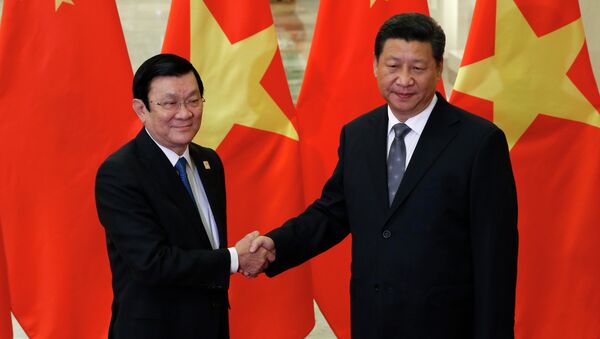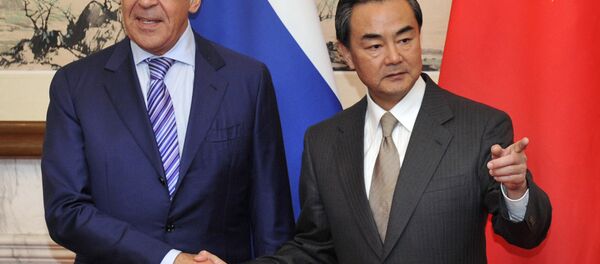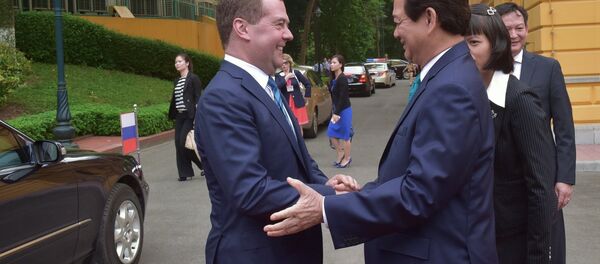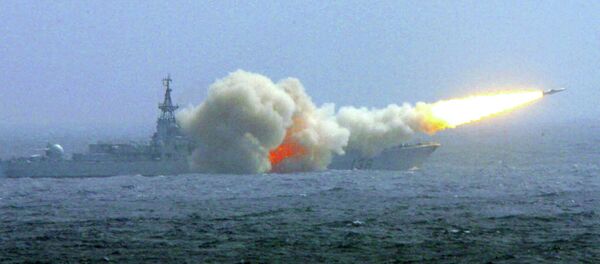China sees "a new spring" in its relations with Vietnam ahead of the country's Communist Party General Secretary Nguyen Phu Trong's visit to Beijing, a commentary in the country's state-run Xinhua news agency said on Monday.
Vietnam has been the focus of increased attention for Russia, China and the United States in the past several weeks, with rows over Russian refueling flights and a US Congressional visit to the country. Russian Prime Minister Dmitry Medvedev arrived with a two-day visit to the country on Monday.
Ahead of the visit, Wang Yi said that Russia and China are united in their views of a multipolar world, the same idea proposed to Vietnam in the Xinhua commentary.
"If and only if China and Vietnam, both strategically and from the view of future trends, put common interests above all else, adhere to friendly association, mutually beneficial cooperation and united development, always resolve controversies and antagonisms in a proper manner and strive to settle issues by political means, Chinese-Vietnamese friendship will certainly develop and become inherited generation to generation," the commentary said.
Medvedev Visit
During his visit to Vietnam on Monday, Medvedev signed several important deals on economic cooperation. In part, Russian oil giant Gazprom Neft will negotiate to buy a 49 percent stake in Vietnam's Dung Quat refinery, which produces 30 percent of the country's refined oil products. Gazprom Neft also intends to modernize the refinery.
The swap could also decrease Vietnam's dependence on oil from the Middle East. The Dung Quat refinery currently gets 85 percent of its oil from Vietsovpetro, a joint venture between PetroVietnam and Russia's Zarubezhneft. The other 15 percent comes from Middle Eastern oil.
Russia and Vietnam also signed deals on the development of railroad infrastructure and assembly of Russian-made automobiles in Vietnam. The deal could mean the expansion of production of the Lada Granta, which has also been rebadged as the Datsun on-Do. Russian truck maker KAMAZ operates a plant in Vietnam which assembles 600 trucks per year.
US Influence
A US Congressional group headed by House of Representatives minority leader Nancy Pelosi arrived in Hanoi for talks with party and state leaders. While the visit was overshadowed by consequences of the US role in the Vietnam War, it also discussed Vietnam's role in the Trans-Pacific Partnership (TPP) trade and investment agreement, which Vietnam signed on to in 2008.
In March, the United States attempted to pressure Vietnam to stop allowing Russian refueling planes to the Vietnamese Cam Ranh base, which is also where Russian-made submarines are stationed.
On April 6, two US Navy ships, the destroyer USS Fitzgerald an the coastal combat ship USS Fort Worth docked in Da Nang, a port in central Vietnam. The visit is part of the 20 year anniversary of diplomatic relations between the two countries.
However, the deal could create internal tensions in Vietnam, as its financial and economic center is in Ho Chi Minh City, in southern Vietnam, while the capital Hanoi is in northern Vietnam.
The US Agency for International Development (USAID), which is known for its role in creating political movements in countries such as Yemen, has been operating governance programs as part of its "Trade Acceleration Plus Project" in Ho Chi Minh City. Ho Chi Minh City used to be called Saigon, and was the capital of US ally South Vietnam prior to Vietnamese reunification in 1975.
The US government broadcaster Radio Free Asia, which employs exiles from former South Vietnam, has its website and radio signals blocked and jammed in Vietnam. The broadcaster focuses on strikes and political tensions in southern Vietnam, particularly Ho Chi Minh City.






